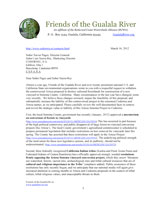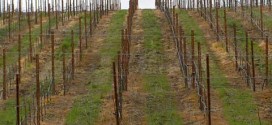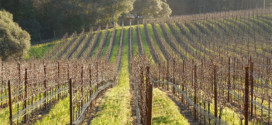FoGR again asks Spanish corporation
to withdraw proposal to clear-cut
coastal redwood forest for vineyards
March 16, 2012
Señor Xavier Pages, Director General
Señor Luis Sierra-Rey, Marketing Director
CODORNIU, S.A.
Edificio Alta 1
Barcelona, Catalonia 08950
Espanña
Dear Señor Pages and Señor Sierra-Rey:
Almost a year ago, Friends of the Gualala River and over twenty prominent national U.S. and California State environmental organizations wrote to you with a respectful request to withdraw the controversial Artesa proposal to destroy redwood forestlands for construction of a new vineyard in Sonoma County, California. Many circumstances in the last year have changed, some very recently. We believe these changes seriously impair the feasibility of this proposal, and substantially increase the liability of this controversial project to the esteemed Codorniu and Artesa names, as we anticipated. Please carefully review the well-documented facts in context and revisit the strategic value or liability of this Artesa Sonoma Project to Codorniu.
First, the local Sonoma County government has recently (January, 2012) approved a moratorium on conversion of forests to vineyards (pressdemocrat.com/article/20120131/ARTICLES/120139916). This has occurred in part because of the high political controversy and public disapproval of large forest-to-vineyard conversion projects like Artesa’s. The local County government’s agricultural commissioner is scheduled to propose permanent legislation that includes restrictions on tree removal for vineyards later this spring. The County has asserted that these restrictions will apply to the Artesa Project (pressdemocrat.com/article/20120131/ARTICLES/120139916). The underlying political strength of the motivation for these new legislative actions, and its publicity, should not be underestimated. (pressdemocrat.com/article/20120126/ARTICLES/120129572)
Second, three federally recognized California Indian tribes (Kashia and Point Arena Pomo and Federated Indians of Graton Rancheria) have officially approved strongly worded resolutions firmly opposing the Artesa Sonoma vineyard conversion project, which they assert “threatens our watershed, forests, sacred sites, archaeological sites and tribal cultural resources that are of cultural and religious importance to the Tribe” (emphasis added). Public awareness of these resolutions has only recently begun, and we anticipate that our national media will again give increased attention in coming months to Artesa and Codorniu proposals in the context of tribal culture, tribal religious values, and unacceptable threats to them.
Third, as you know, a national on-line petition initiated by an independent California citizen (who was inspired by Los Angeles Times news reports of the Artesa project: change.org/petitions/stop-wineries-from-destroying-ca-redwoods-and-native-american-heritage) generated over 92,000 signatures. This petition reflects extraordinary national U.S. public disapproval of this notorious project in association with Codorniu and Artesa. A related local on-line petition generated over 1,800 signatures for the limited purpose of demanding that public comments be accepted by the lead California permit agency for the Project. (GualalaRiver.org/vineyards/https://gualalariver.org/wp/vineyards/artesa/).
Fourth, the final Environmental Impact Report required for the permit approval of the Artesa Project is deeply flawed in many important technical respects, and is ripe for challenge on many environmental and cultural resource issues, with support from recognized experts. For example, the Tribal resolution complaints against Artesa and Cordorniu are strongly supported by the scientific expertise of an authoritative Professor of Archaeology and Anthropology. These disputes will inevitably contribute to protracted controversy and adverse publicity (GualalaRiver.org/vineyards/https://gualalariver.org/wp/vineyards/artesavineyards-facebook/).
Finally, we hope you are by now fully aware of the intense national and California media attention generated jointly by the Artesa Project and the Preservation Ranch vineyard conversion proposals. A series of very prominent front page and feature articles on this pair of Sonoma vineyard conversion projects has appeared in the Los Angeles Times (latimes.com/news/local/la-me-0825-redwoods-vineyards-20110825,0,3104451,full.story), and in hundreds of leading newspapers carrying an Associated Press syndicated article, (http://www.google.com/search?q=Plan+to+cut+forest+for+vineyards+faces+opposition), as well as intensive critical coverage in financial journals (Financial Advisor – fa-mag.com/fa-news/9789-vintage-capital.html) and in Northern California Wine Country magazines and newspapers (Bohemian – bohemian.com/northbay/fall-of-the-redwood-empire/Content?oid=2200342; North Bay Biz – northbaybiz.com/General_Articles/General_Articles/Into_the_Woods.php; Santa Rosa Press Democrat – pressdemocrat.com/article/20110731/ARTICLES/110739987/1334/news). We fully expect media coverage to surge again to greater levels during inevitable objections or challenges to the final permits for the Artesa project.
Is this outdated proposal from the speculative Pinot Noir frenzy of 2001 still sufficiently valuable and feasible for Codorniu to risk the effects of intense, media-based, negative publicity this notorious project poses to the Codorniu name and Artesa brand? Given that the project has not advanced in approval after over 10 years since its inception, and given that it faces further significant delay and adverse publicity due to opposition and challenge, is this single project still a sufficiently reasonable investment and marketing strategy for you to pursue? Please consider this question in the context of the availability of alternative sites, due to many vineyards for sale during a period of industry consolidation in Northern California. (northbaybusinessjournal.com/32213/wine-industry-conference-2011-questions-for-the-ma-panel)
We hope you share our sincere wish to avoid needless costly conflict and controversy over this project. We offer an alternative, cooperative course of action. We would be willing to endorse and facilitate Codorniu’s effort to sell the parcel to a consortium of conservancy and land trust organizations who are dedicated to conserving the important natural and cultural resources of the project site. We would publicly support praiseworthy actions by Codorniu to benefit for the fish and wildlife resources of the Gualala River’s forested watershed and for the protection of California Indian tribal uses and cultural heritage. This would turn the controversy into a marketing benefit for Artesa, and enable them to reinvest in productive wine grape land located in established, proven agricultural areas with no impacts of forest conversion. We would be pleased to work with you in finding interested conservation buyers at fair market value of the land. Again, we offer to promote widespread endorsement of Codorniu’s environmental stewardship and positive publicity for Artesa if you pursued this alternative in collaboration with us and our allied conservation organizations.
Sincerely,
Chris Poehlmann
President, Friends of the Gualala River
contact@gualalariver.org
www.gualalariver.org
cc:
Associated Press
Bohemian
California Northern
Independent Coast Observer
Los Angeles Times
New York Times
North Bay Biz
Sacramento Bee
San Francisco Chronicle
Santa Rosa Press Democrat
Sonoma Gazette
El Periodico – a Barcelona newspaper
For additional information, see:
Coalition asks Spanish corporation to withdraw proposal to clear-cut coastal redwood forest for vineyards Friends of the Gualala River has joined with national, California, and regional environmental organizations in asking the international wine corporation, Codorniu of Barcelona, Spain, to withdraw its controversial proposal to destroy nearly 150 acres of coastal redwood forest by clear-cutting and converting the area for new vineyards to produce wine grapes.
Friends of the Gualala River has joined with national, California, and regional environmental organizations in asking the international wine corporation, Codorniu of Barcelona, Spain, to withdraw its controversial proposal to destroy nearly 150 acres of coastal redwood forest by clear-cutting and converting the area for new vineyards to produce wine grapes.
 Artesa (“Fairfax”) vineyard conversion EIR
Artesa (“Fairfax”) vineyard conversion EIR
CAL FIRE released the Final Environmental Impact Report (EIR) for Artesa Winery’s plan to clear-cut 154 acres of coastal redwood forest to plant a vineyard in Annapolis. The EIR states that the project will have no significant environmental or cultural impacts.
The Mendonoma Coast’s Second Spanish Invasion Spanish wine corporation Grupo Codorníu is accustomed to doing things in a big way. It is reputed to own a greater expanse of vineyard acreage than any wine company in Spain, which in turn has more land under grapevine cultivation than any nation in the world.
Spanish wine corporation Grupo Codorníu is accustomed to doing things in a big way. It is reputed to own a greater expanse of vineyard acreage than any wine company in Spain, which in turn has more land under grapevine cultivation than any nation in the world.
June, 2011, Anderson Valley Advertiser
 Multinational Targets the Gualala River
Multinational Targets the Gualala River
What if the third largest winery in the world, based in Spain, chose the recovering Gualala River watershed for a large vineyard project?
 Pomo heritage threatened
Pomo heritage threatened
The Artesa vineyard project area is “very possibly the Kashaya Pomo village Kabatui” where “human remains may be present,” and which contains rich archaeological areas that are eligible for listing in the National Registry of Historic Places.
 Pomo elders speak out about vineyards
Pomo elders speak out about vineyards
Where we used to live, no one can see anything now. It is time we open our mouths. Those vineyard people are interfering with our ancestors’ area…
 Erasing Native American history?
Erasing Native American history?
As an early morning mist filters through the Redwoods in the village of Annapolis in NW Sonoma County, a Pomo elder of the Kashia band walks through the forest toward an ancient settlement site…
 Desecration of Pomo history
Desecration of Pomo history
A first step toward satisfying the responsibility for Europeans and their descendants in North America would be to treat indigenous people with respect.
 Friends of Gualala River Protecting the Gualala River watershed and the species living within it
Friends of Gualala River Protecting the Gualala River watershed and the species living within it



